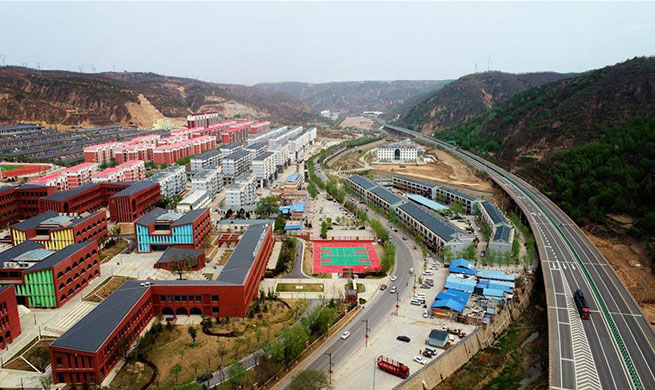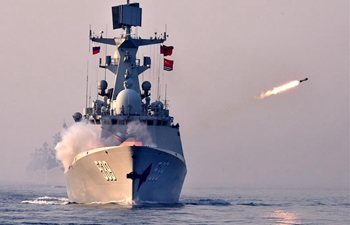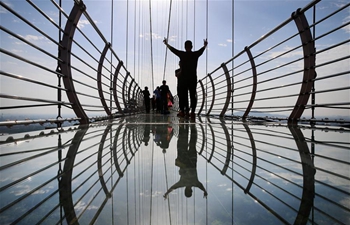TEHRAN, May 8 (Xinhua) -- Iran's withdrawal from implementing parts of the 2015 nuclear deal on Wednesday will be intensified in future in case Tehran's interests under the pact cannot be honored, Iranian authorities said.
The move by Iran comes after its persistent demands that the Europeans and other signatories of the deal should protect Tehran's economic and financial interests were not heeded appropriately.
On Wednesday, ambassadors of France, Britain, Germany, Russia and China in Tehran received letters authorized by Iran's Supreme National Security Council (SNSC), saying that Iran scales back compliance with two of its commitments under the nuclear deal.
Iran might stop more compliance with the nuclear deal after 60 days, the letters revealed.
Iran's initial steps to stray away from its commitments subject to the deal were detailed by Iranian President Hassan Rouhani's televised speech on Wednesday when he said that Iran would begin to build up stockpiles of its enriched uranium and heavy water.
"It doesn't mean that Iran leaves the nuclear agreement, known as Joint Comprehensive Plan of Action (JCPOA)," he said.
The Iranian president said that Iran is ready for talks on its JCPOA-related economic interests, in which wide range of sanctions on the Iranian economy had been lifted but were reimposed by U.S. President Donald Trump following his entire withdrawal from the 2015 agreement last year.
Under the nuclear deal clinched between Iran and world's six major powers in 2015, Iran accepted to send out its low-grade enriched uranium once its production exceeded 300 kg. Besides, Iran had to sell the extra amount heavy water product beyond 130 tons.
Iran will wait for 60 days to start negotiations with the signatories of the nuclear deal over its economic interests enshrined by the nuclear deal, including its oil sales and international banking transactions, Rouhani said on Wednesday.
"The path we have chosen today is not the path of war. It is the path of diplomacy," Rouhani said, adding that if Iran achieves no results after 60 days, it will adopt two more counter-measures to the U.S. withdrawal from the deal.
Rouhani threatened that Iran might increase the level of uranium enrichment and start modernizing its heavy water reactor.
"Under the nuclear deal, Iran accepted to keep the level of its enriched uranium at 3.67 percent. After 60 days (if there is no result for talks), we will not honor the level for uranium enrichment," he said.
"At that time, Iran will also start to complete the construction of the Arak Heavy Water establishment," he added.
Earlier on Wednesday, Iran's SNSC said in a statement that "at the current juncture, we are not committed to complying with the restrictions on the enriched uranium reserves and heavy water supplies."
The statement also set a 60-day deadline for the remaining parties to the deal to fulfill their obligations, particularly in preserving Iran's interests in the areas of banking and oil.
Prior to the president's letters and SNSC statement, Iranian Foreign Minister Mohammad Javad Zarif said that Iran's measures to halt parts of it compliance to the deal are enshrined by the Articles 26 and 36 of JCPOA.
According to the articles, Iran or any other signatory of the deal is entitled to stop implementing parts or all of their commitments under the document in case any party fails to remain committed to its obligations, he said.
"Iran is not leaving the JCPOA, rather, it is acting totally within the framework of Articles 26 and 36 of the deal," he added.
"Unfortunately, the European Union and other members of the international community could not stand up to the U.S. pressures," he said.
Zarif added that Iran's move provides "an opportunity for other parties to the deal to take required measures, not just issue statements."
On May 4, U.S. State Department Spokesperson Morgan Ortagus said in a statement that Washington revokes two waivers that allowed Iran to ship its excess heavy water and swap its enriched uranium for natural uranium.
"The decisions today enhance our ability to constrain Iran's nuclear program while pursuing maximum economic pressure," Brian Hook, U.S. special representative for Iran, said on Friday.
Trump pulled Washington out the Iranian international nuclear deal in May last year and returned energy and financial sanctions against the Iran.
Washington seeks to seal a new nuclear deal with Iran to further curb Iran's nuclear program, stop Iran's ballistic missile development and brake Iran's push for influence in the region.

















